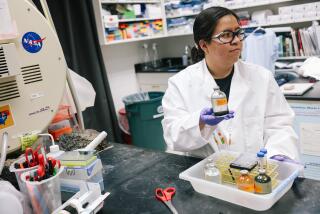Accused movie shooter called a mediocre student intern
- Share via
During the summer of 2006, James Holmes, then 18 and just graduated from high school, was an intern at a prestigious computer laboratory at the Salk Institute at UC San Diego.
On paper, at least, the position seemed to indicate that Holmes possessed a keen and brilliant intellect. That’s how some former acquaintances have described Holmes, whom authorities have arrested in the fatal shootings at a crowded movie theater in Aurora, Colo.
But a graduate student who worked with Holmes at the Salk Institute’s Computational Neurobiology Laboratory had a far different view, recalling him as a “mediocre” student who was enormously stubborn.
“I saw a shy, pretty socially inept person,” said John Jacobson, now a PhD candidate at UC San Diego in philosophy and cognitive sciences. “I didn’t see any behavior that would be indicative of violence then or in the future.”
But “he should not have gotten into the summer program,” Jacobson said. “His grades were mediocre. I’ve heard him described as brilliant. This is extremely inaccurate.”
Jacobson said Holmes was accepted as the Salk Institute’s summer intern because at the time the Institute was not marketing its program to the top math and physics high school students. Holmes was accepted because his resume indicated he had done some computer programming, Jacobson told the Los Angeles Times. But his high school transcripts showed Bs and B+s, and no Advanced Placement classes, Jacobson said.
Jacobson said after that summer, administrators changed recruiting policies and now get applications from very high-level math and physics students.
In a video of a summer-end presentation, Holmes names Jacobson as his “mentor.”
“That is not true. That’s almost slanderous,” Jacobson said. “I was never his mentor.”
Holmes worked briefly for him over eight weeks that Jacobson described as very frustrating, characterized by the young man’s unwillingness to follow Jacobson’s suggestions — contrary to the usually engaging experience Jacobson said he’s had working with high school students.
“My experience with him was quite bad,” Jacobson said.
He said he set Holmes to work writing computer code for an experiment Jacobson had done involving a game of rock-paper-scissors, in which the computer always beats the human, no matter who goes first.
The experiment was in Flash, which Jacobson said is best encoded using what’s called object-oriented programming. Holmes insisted on using what’s known as procedural programming, much more time consuming and complicated, Jacobson said.
Holmes was, however, extremely receptive to compliments, which was “how I got him to do the little that he did,” Jacobson said.
For two weeks, Jacobson said, “he was absolutely stubborn. I was at a loss to how to get him to program in an object-oriented way. He just refused. Finally, I said, ‘Do it any way you can.’”
Jacobson said he had minimal contact with Holmes for the next six weeks, daily dropping by in the morning to see if the intern was at least at work, and then returning to his own research.
“I basically fired him,” Jacobson said.
Jacobson said the students the Institute recruits as interns now could finish such a project in less than a week. “He never completed the project. What he gave me was a complete mess,” Jacobson said.
Jacobson said he did try to bring Holmes out of his shell that summer. At one point, he said, he took Holmes to another floor where a high school girl was working.
“He just had no interest,” Jacobson said. “I’m trying to introduce him to the other high school students and he’s incredibly uncommunicative.
“I attributed all this to adolescent shyness, maybe feeling intimidated to people around him.”
ALSO:
Aurora pastor to 33 members: ‘Very, very happy God spared you’
Colorado rampage: Legally, focus to be death penalty, expert says
Trips wires, Batman items found in theater shootings uspects’ home
More to Read
Sign up for Essential California
The most important California stories and recommendations in your inbox every morning.
You may occasionally receive promotional content from the Los Angeles Times.










